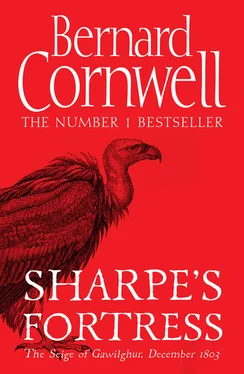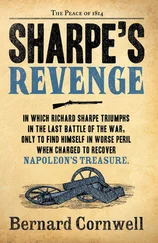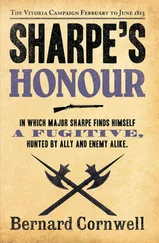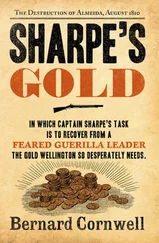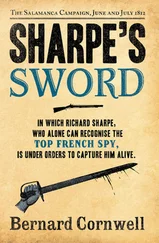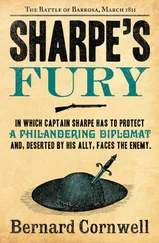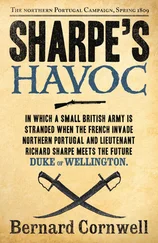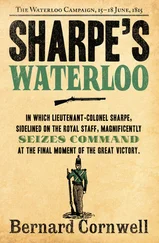Bernard Cornwell - Sharpe’s Fortress - The Siege of Gawilghur, December 1803
Здесь есть возможность читать онлайн «Bernard Cornwell - Sharpe’s Fortress - The Siege of Gawilghur, December 1803» — ознакомительный отрывок электронной книги совершенно бесплатно, а после прочтения отрывка купить полную версию. В некоторых случаях можно слушать аудио, скачать через торрент в формате fb2 и присутствует краткое содержание. Жанр: unrecognised, на английском языке. Описание произведения, (предисловие) а так же отзывы посетителей доступны на портале библиотеки ЛибКат.
- Название:Sharpe’s Fortress: The Siege of Gawilghur, December 1803
- Автор:
- Жанр:
- Год:неизвестен
- ISBN:нет данных
- Рейтинг книги:3 / 5. Голосов: 1
-
Избранное:Добавить в избранное
- Отзывы:
-
Ваша оценка:
- 60
- 1
- 2
- 3
- 4
- 5
Sharpe’s Fortress: The Siege of Gawilghur, December 1803: краткое содержание, описание и аннотация
Предлагаем к чтению аннотацию, описание, краткое содержание или предисловие (зависит от того, что написал сам автор книги «Sharpe’s Fortress: The Siege of Gawilghur, December 1803»). Если вы не нашли необходимую информацию о книге — напишите в комментариях, мы постараемся отыскать её.
Sharpe’s Fortress: The Siege of Gawilghur, December 1803 — читать онлайн ознакомительный отрывок
Ниже представлен текст книги, разбитый по страницам. Система сохранения места последней прочитанной страницы, позволяет с удобством читать онлайн бесплатно книгу «Sharpe’s Fortress: The Siege of Gawilghur, December 1803», без необходимости каждый раз заново искать на чём Вы остановились. Поставьте закладку, и сможете в любой момент перейти на страницу, на которой закончили чтение.
Интервал:
Закладка:
‘He’s only a lad!’ a Scottish voice shouted in warning as the ranks closed again.
It was not a short man at all, but a boy. Maybe only twelve or thirteen years old, Sharpe guessed as he fended off the scimitar with the musket barrel. The boy thought he could win the battle single-handed and leaped at Sharpe, who parried the sword and stepped back to show he did not want to fight. ‘Put it down, lad,’ he said.
The boy spat, leaped and cut again. Sharpe parried a third time, then reversed the musket and slammed its stock into the side of the boy’s head. For a second the lad stared at Sharpe with an astonished look, then he crumpled to the turf.
‘They’re breaking!’ Wellesley shouted from somewhere close by. ‘They’re breaking!’
Colonel Wallace was in the front rank now, slicing down with his claymore. He hacked like a farmer, blow after blow. He had lost his cocked hat and his bald pate gleamed in the late sunlight. There was blood on his horse’s flank, and more blood spattered on the white turnbacks of his coat tails. Then the pressure of the enemy collapsed and the horse twisted into the gap and Wallace spurred it on. ‘Come on, boys! Come on!’ A man stooped to rescue Wallace’s cocked hat. Its plumes were blood-soaked.
The Arabs were fleeing. ‘Go!’ Swinton shouted. ‘Go! Keep ’em running! Go!’
A man paused to search a corpse’s robes and Sergeant Colquhoun dragged the man up and pushed him on. The file-closers were making sure none of the enemy bodies left behind the Scottish advance were dangerous. They kicked swords and muskets out of injured men’s hands, prodded apparently unwounded bodies with bayonets and killed any man who showed a spark of fight. Two pipers were playing their ferocious music, driving the Scots up the gentle slope where the big Arab drums had been abandoned. Man after man speared the drumskins with bayonets as they passed.
‘Forward on! Forward on!’ Urquhart bellowed as though he were on a hunting field.
‘To the guns!’ Wellesley called.
‘Keep going!’ Sharpe bellowed at some laggards. ‘Go on, you bastards, go on!’
The enemy gun line was at the crest of the low rise, but the Mahratta gunners dared not fire because the remnants of the Lions of Allah were between them and the redcoats. The gunners hesitated for a few seconds, then decided the day was lost and fled.
‘Take the guns!’ Wellesley called.
Colonel Wallace spurred among the fleeing enemy, striking down with the claymore, then reined in beside a gaudily painted eighteen-pounder. ‘Come on, lads! Come on! To me!’
The Scotsmen reached the guns. Most had reddened bayonets, all had sweat streaks striping their powder-blackened faces. Some began rifling the limbers where gunners stored food and valuables.
‘Load!’ Urquhart called. ‘Load!’
‘Form ranks!’ Sergeant Colquhoun shouted. He ran forward and tugged men away from the limbers. ‘Leave the carts alone, boys! Form ranks! Smartly now!’
Sharpe, for the first time, could see down the long reverse slope. Three hundred paces away were more infantry, a great long line of it massed in a dozen ranks, and beyond that were some walled gardens and the roofs of a village. The shadows were very long for the sun was blazing just above the horizon. The Arabs were running towards the stationary infantry.
‘Where are the galloper guns?’ Wallace roared, and an aide spurred back down the slope to fetch the gunners.
‘Give them a volley, Swinton!’ Wellesley called.
The range was very long for a musket, but Swinton hammered the battalion’s fire down the slope, and maybe it was that volley, or perhaps it was the sight of the defeated Arabs that panicked the great mass of infantry. For a few seconds they stood under their big bright flags and then, like sand struck by a flood, they dissolved into a rabble.
Cavalry trumpets blared. British and sepoy horsemen charged forward with sabres, while the irregular horse, those mercenaries who had attached themselves to the British for the chance of loot, lowered their lances and raked back their spurs.
It was a cavalryman’s paradise, a broken enemy with nowhere to hide. Some Mahrattas sought shelter in the village, but most ran past it, throwing down their weapons as the terrible horsemen streamed into the fleeing horde with sabres and lances slicing and thrusting.
‘ Puckalees !’ Urquhart shouted, standing in his stirrups to look for the men and boys who brought water to the troops. There was none in sight and the 74th was parched, the men’s thirst made acute by the saltpetre in the gunpowder which had fouled their mouths. ‘Where the …?’ Urquhart swore, then frowned at Sharpe. ‘Mister Sharpe? I’ll trouble you to find our puckalees .’
‘Yes, sir,’ Sharpe said, not bothering to hide his disappointment at the order. He had hoped to find some loot when the 74th searched the village, but instead he was to be a fetcher of water. He threw down the musket and walked back through the groaning, slow-moving litter of dead and dying men. Dogs were scavenging among the bodies.
‘Forward now!’ Wellesley called behind Sharpe, and the whole long line of British infantrymen advanced under their flags towards the village. The cavalry was already far beyond the houses, killing with abandon and driving the fugitives ever farther northwards.
Sharpe walked on southwards. He suspected the puckalees were still back with the baggage, which would mean a three-mile walk and, by the time he had found them, the battalion would have slaked its thirst from the wells in the village. Bugger it, he thought. Even when they gave him a job it was a useless errand.
A shout made him look to his right where a score of native cavalrymen were slicing apart the robes of the dead Arabs in search of coins and trinkets. The scavengers were Mahrattas who had sold their services to the British and Sharpe guessed that the horsemen had not joined the pursuit for fear of being mistaken for the defeated enemy. One of the Arabs had only been feigning death and now, despite being hugely outnumbered, defied his enemies with a pistol that he dragged from beneath his robe. The taunting cavalrymen had made a ring and the Arab kept twisting around to find that his tormentor had skipped away before he could aim the small gun.
The Arab was a short man, then he turned again and Sharpe saw the bruised, bloody face and recognized the child who had charged the 74th so bravely. The boy was doomed, for the ring of cavalrymen was slowly closing for the kill. One of the Mahrattas would probably die, or at least be horribly injured by the pistol ball, but that was part of the game. The boy had one shot, they had twenty. A man prodded the boy in the back with a lance point, making him whip round, but the man with the lance had stepped fast back and another man slapped the boy’s headdress with a tulwar . The other cavalrymen laughed.
Sharpe reckoned the boy deserved better. He was a kid, nothing more, but brave as a tiger, and so he crossed to the cavalrymen. ‘Let him be!’ he called.
The boy turned towards Sharpe. If he recognized that the British officer was trying to save his life he showed no sign of gratitude; instead he lifted the pistol so that its barrel pointed at Sharpe’s face. The cavalrymen, reckoning this was even better sport, urged him to shoot and one of them approached the boy with a raised tulwar , but did not strike. He would let the boy shoot Sharpe, then kill him. ‘Let him be,’ Sharpe said. ‘Stand back!’ The Mahrattas grinned, but did not move. Sharpe could take the single bullet, then they would tear the boy into sabre-shredded scraps of meat.
The boy took a step towards Sharpe. ‘Don’t be a bloody fool, lad,’ Sharpe said. The boy obviously did not speak English, but Sharpe’s tone was soothing. It made no difference. The lad’s hand was shaking and he looked frightened, but defiance had been bred into his bone. He knew he would die, but he would take an enemy soul with him and so he nerved himself to die well. ‘Put the gun down,’ Sharpe said softly. He was wishing he had not intervened now. The kid was just distraught enough and mad enough to fire, and Sharpe knew he could do nothing about it except run away and thus expose himself to the jeers of the Mahrattas. He was close enough now to see the scratches on the pistol’s blackened muzzle where the rammer had scraped the metal. ‘Don’t be a bloody fool, boy,’ he said again. Still the boy pointed the pistol. Sharpe knew he should turn and run, but instead he took another pace forward. Just one more and he reckoned he would be close enough to swat the gun aside.
Читать дальшеИнтервал:
Закладка:
Похожие книги на «Sharpe’s Fortress: The Siege of Gawilghur, December 1803»
Представляем Вашему вниманию похожие книги на «Sharpe’s Fortress: The Siege of Gawilghur, December 1803» списком для выбора. Мы отобрали схожую по названию и смыслу литературу в надежде предоставить читателям больше вариантов отыскать новые, интересные, ещё непрочитанные произведения.
Обсуждение, отзывы о книге «Sharpe’s Fortress: The Siege of Gawilghur, December 1803» и просто собственные мнения читателей. Оставьте ваши комментарии, напишите, что Вы думаете о произведении, его смысле или главных героях. Укажите что конкретно понравилось, а что нет, и почему Вы так считаете.
